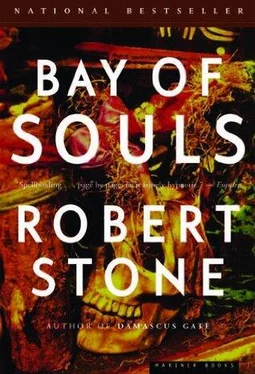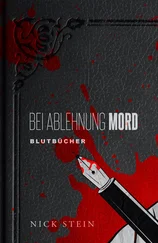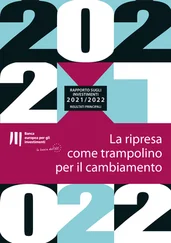"Lara," he said.
Someone shouted in Creole.
"Kiss the blades," someone said evenly.
He tried. He would think afterward that he had tried. He could not close his eyes on the hateful stinking figure that whirled in front of him.
"Hag," he said. He screamed it. People shouted. He began to fall; by the time he righted himself, he saw Lara again. She had turned away from him.
"Lara!"
It was Lara, no longer Marinette. It was his Lara, he thought, returned to him, beautiful and wise, her legs steady beneath her, her moves that of the athlete he remembered. She carried two of the small decorated jars that stood on shelves along the temple wall. She turned, facing him across the hounfor.
He thought he heard shots in the dark forest around them, in the direction of the ocean. But now a tall man stood in front of him, a man in a bent stovepipe hat. He wore an old frock coat and red vest decorated with knitted vevers.
"Michael," Lara said to him. "This is Ghede. See what he has for you." The serviteurs came to Michael as they had to Lara, pressing their red bandanas and kerchiefs against his head. He heard the drums beat. "This is for you, Michael," Lara said.
Then he wondered if she was the same Lara after all.
In front of him was the tall man in the top hat, smiling.
"Michael," Ghede said. "Michael. Mickey boy."
"He's Ghede, Michael," the mambo said, offering him rum.
"Drink it, Michael, mate," said Ghede. Then he was gone.
Listening, Michael knew immediately the drums were speaking to him. It was so obvious, he thought; they had been playing out his fortunes from the first moment he had heard them, so many hours before. They had never left him. They were filled with fragments of his life's time, encoding voices he knew. In the rhythm of the seconde he could hear his own breathing against the respirator, as it must have sounded under the ocean.
"Oh, Michael," Lara said. "Our Ghede. Papa Ghede. Our great Baron. Baron Samedi."
He wondered if he had ever realized how sweet her voice was, how strange and lovely were the little touches of island music in her speech. He looked at her beside him. Whatever love meant, he thought, was here.
Now Baron Samedi came again, out of the darkness, around the poto mitan where the spirit of Dambala held power. Baron Samedi pushed a wheelbarrow. The wheelbarrow had a rivet that made it look flexible. In it, its red strangled tongue brighter than anything else in the flames, was a goat.
"Hi ho, Michael," said Baron Samedi. "Hey, look here what I have got for you."
He began to back away. Lara went with him, after him. The mambo came, and the great Baron, the Baron Samedi.
"Who are you, for Christ's sake?" Michael asked. He was backing away fast, moving so quickly that Lara had begun to hurry to keep up with him. "Who the fuck can you possibly be?"
Baron Samedi began to laugh, a false hearty laugh like a clown's or a clergyman's. He shook the wheelbarrow and the goat in it. The drums beat for them.
"When the man has his life between living and dying he got to know me. Ho ho. Such a rogue, Michael. Don't know what lies between."
"And it's where he's at," Lara said. Or someone using Lara's voice, because she would never say "where he's at."
"Hey, Michael," Baron Samedi called. "Live for Sunday or go to the graveyard. What for Michael — am I Baron Samedi?"
"Listen to him, Michael," Lara called. She sounded some distance away. There were fewer fires. The crowd was milling close.
"Yes, I say!" shouted Baron Samedi. "I am the Baron Samedi. Without Friday, I can't be. Without Sunday, ain't no me. In that space…"and the Baron drew a long breath, pronouncing a word that Michael was not born to hear.
"Who are you, man?" Michael asked him.
For an answer he got clown laughter and ho ho ho and the shaking of the wheelbarrow. Suddenly he was at close quarters with Roger Hyde.
"If I were you," Roger said, "I wouldn't try to play these games."
"What?"
"If I were you," Roger said, "I should save my life."
When he ran into the darkness, the drums seemed to be keeping after him. He was running before he knew it, himself taken by surprise. He had started somehow, and thereafter it had been impossible to stop, impossible to do anything but increase speed. Waist-high scrub kept tripping him up, throwing him against the stony ground and stripping his skin as though he were being dragged the distance he covered. Then he was running in shallow water with a firm rocky bottom. He saw fires ahead and turned to get his bearings. He had covered a great distance from the lodge. Its ceremonial fires were still burning and he could see figures outlined against them.
The drums sounded on, and it was still his time they beat. He ran through black space, splashing, running as it were in his own grave, running away from Baron Samedi, whose dark space he inhabited, the presiding god of his life and lord of his adventures. The lord of all who had made a grave of their lives. Baron Samedi's drums still beat for him.
But there were fires ahead too, and electric light flickering among them. He was encouraged, although the water around his legs was growing deeper and the bottom grew softer and clung to his steps. He heard shots, someone was firing; the reports were mostly single but now and then there came a burst of automatic fire. None of the shooting was close as far as he could tell.
His exhaustion made a copper taste in his mouth. He could hear his own breathing, a dry wheeze, unrelieved. Still gagging on the taste of the fiery alcohol, he wanted water. He put down a hand as he ran, trying to scoop up something cool and drinkable; the move threw him off balance, into a series of crazy-legged staggers from which he recovered with difficulty. His cupped hand brought up something bad-smelling, much too thick to drink and too repellent.
He thought he heard other runners behind him, splashing through the same stream he had followed, fanned out from bank to bank. He saw a car maneuvering along a road fifty yards away, halfway up a rise. The fires ahead were close to the road, barrel fires that stank of gasoline and sent out fumes of oily black smoke, visible in the fire's own light. The hill along which the road ran was walled by ridges of congealed earth whose contours showed against the firelight like the definitions on a relief map. At the top of the same hill, searchlights were being played around the valley. He did not try to stay out of their way, only to find his own by their intermittent patterns.
For a while, as he ran, he believed absolutely that Baron Samedi was running with him, not staggering in the same ungainly manner but moving along beside him, for amusement, to exercise his possession. He had to concentrate to put the thought out of his mind.
Reaching the road, he saw that its surface showed the traces of paving. For the first time since he had started running he was confronted with his own rational intentions. He had been running with the god entirely. The god had been his pursuer, his goal, the notion of his nearly mindless flight, the process of running.
Along that remnant of a modern road he felt he was either leaving the illusion of his master's presence or entering an illusion in which he was free of it. He had stopped running. There was no more breath for it.
Before him was a blocu. Fifty or so island people, almost all of them men, stood in the road. Piles of old half-burnt tires were heaped along the shoulder. Big hundred-gallon drums filled with tire strips sent up a black stink, like meat butchered and roasted raw, the living flesh of some vile animal. Farther from the road he could see stripped tires piled in towers and burning. Others stood as though prepared for the next occasion, a midnight Mass of Pére Lebrun, when the living meat would be less exotic, a more familiar dish, and the mystic ritual would be transubstantiation in reverse as every grain of life transcendent was burned howling out of the beast.
Читать дальше












